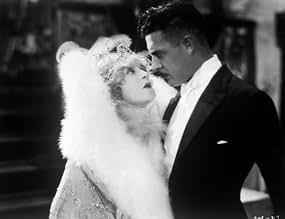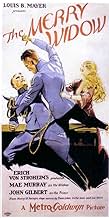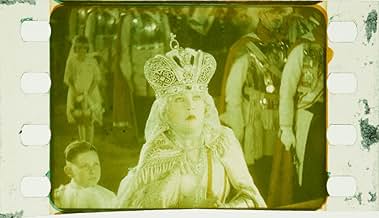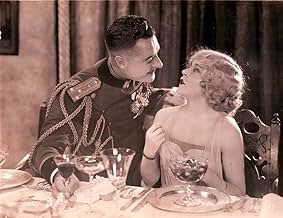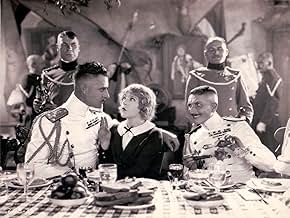IMDb RATING
7.2/10
2.7K
YOUR RATING
A prince must woo the now-wealthy dancer he once abandoned, to keep her money in the country in order to keep it from crashing economically.A prince must woo the now-wealthy dancer he once abandoned, to keep her money in the country in order to keep it from crashing economically.A prince must woo the now-wealthy dancer he once abandoned, to keep her money in the country in order to keep it from crashing economically.
- Awards
- 3 wins total
Gertrude Bennett
- Hard-Boiled Virginia
- (uncredited)
Bernard Berger
- Boy
- (uncredited)
Sidney Bracey
- Danilo's Footman
- (uncredited)
Estelle Clark
- French Barber
- (uncredited)
Albert Conti
- Danilo's Adjutant
- (uncredited)
D'Arcy Corrigan
- Horatio
- (uncredited)
Joan Crawford
- Ballroom Dancer
- (uncredited)
Xavier Cugat
- Orchestra Leader
- (uncredited)
Anielka Elter
- Blindfolded Musician
- (uncredited)
Dale Fuller
- Sadoja's Chambermaid
- (uncredited)
Clark Gable
- Ballroom Dancer
- (uncredited)
Featured reviews
This is the kind of silent film that is so enjoyable to watch. Huge budget with a great cast. In the climatic dance sequence, where the "Merry Widow" dances, both Clark Gable and Myrna Loy, both unknowns at the time, were extras.
Superb film by Erich von Stroheim who "personally directed" this lush and romantic blockbuster starring Mae Murray and John Gilbert.
Gilbert plays a European prince who falls for American "danseuse" Murray. Of course his leering cousin the Crown prince (Roy D'Arcy) also has a yen for blonde Murray. The boys clash but Murray prefers Gilbert until he is tricked into jilting her at the altar. She then marries the nation's leading banker (Tully Marshall) who has a foot fetish. He croaks of their wedding night and she becomes "The Merry Widow," a notorious party goer and high liver.
The lovers meet again at Maxim's in Paris where Murray pretends to prefer the oozing D'Arcy. Gilbert gets drunk. On a morning horse ride Murray and D'Arcy come across Gilbert sprawled drunk by the roadside. In a fit, Gilbert strikes the loathsome prince and is challenged to a duel. Murray races to the fog-ridden gunfest but Gilbert has already been shot.
Von Stroheim, notorious for his excesses in GREED is more constrained with THE MERRY WIDOW but still manages some startlingly decadent touches. Murray is fabulous as a the dancer and gets one whole routine to herself a la Martha Grahame as well as the striking and sensual waltz with Gilbert. Gilbert seethes with masculinity and lust for Murray. They are quite a couple. Von Stroheim gives each star maximum close-ups to great effect. Murray has two grand entrances: one in black gown and diamonds for a royal ball; a second all in white fur cape and feathers for her entrance at Maxim's.
The film is highly dramatic, romantic, and sensual but manages touches of humor. A real feast. George Fawcett is the old king; Josephine Crowell is the queen.
In 1925 John Gilbert would have been a shoe in for a best actor Oscar between his performances in THE MERRY WIDOW and THE BIG PARADE. Murray would likely have been a best actress contender. Great film.
Gilbert plays a European prince who falls for American "danseuse" Murray. Of course his leering cousin the Crown prince (Roy D'Arcy) also has a yen for blonde Murray. The boys clash but Murray prefers Gilbert until he is tricked into jilting her at the altar. She then marries the nation's leading banker (Tully Marshall) who has a foot fetish. He croaks of their wedding night and she becomes "The Merry Widow," a notorious party goer and high liver.
The lovers meet again at Maxim's in Paris where Murray pretends to prefer the oozing D'Arcy. Gilbert gets drunk. On a morning horse ride Murray and D'Arcy come across Gilbert sprawled drunk by the roadside. In a fit, Gilbert strikes the loathsome prince and is challenged to a duel. Murray races to the fog-ridden gunfest but Gilbert has already been shot.
Von Stroheim, notorious for his excesses in GREED is more constrained with THE MERRY WIDOW but still manages some startlingly decadent touches. Murray is fabulous as a the dancer and gets one whole routine to herself a la Martha Grahame as well as the striking and sensual waltz with Gilbert. Gilbert seethes with masculinity and lust for Murray. They are quite a couple. Von Stroheim gives each star maximum close-ups to great effect. Murray has two grand entrances: one in black gown and diamonds for a royal ball; a second all in white fur cape and feathers for her entrance at Maxim's.
The film is highly dramatic, romantic, and sensual but manages touches of humor. A real feast. George Fawcett is the old king; Josephine Crowell is the queen.
In 1925 John Gilbert would have been a shoe in for a best actor Oscar between his performances in THE MERRY WIDOW and THE BIG PARADE. Murray would likely have been a best actress contender. Great film.
A romantic Prince from tiny Monteblanco attempts to woo THE MERRY WIDOW who once loved him when she was a poor dancer.
Erich von Stroheim, the Teutonic genius who marched through Hollywood's Silent Days like a conquering general, had his final directorial stint at MGM Studios producing this lavish & brilliant film based on the operetta by Franz Lehár. The visuals are striking, with sets that look like actual locations--a mountaintop village; the Castellano Cathedral; Maxim's in Paris--and the occasional bizarre touch--the blindfolded musicians sharing the Prince's seduction bed, for example--which von Stroheim relished. The acting is flawless, with no need for dialogue. The actors' faces speak all that need be said.
Mae Murray & John Gilbert portray the passionate lovers whom Fate (and the plot) contrives to keep apart so successfully. Miss Murray (she and the director loathed each other) powerfully portrays a street-wise performer who, through a series of heartbreaks, becomes a vastly wealthy woman. Gilbert expertly plays a prince whose charm has always gotten him his way. Their scenes together, most particularly the waltz sequences, fairly blaze with unrequited sensual longing and desire.
While it is entertaining to wonder what von Stroheim would have done with the role, it is difficult to imagine anyone better than Roy D'Arcy as the simpering, lusting, sneering Crown Prince; he is pure villainy personified and his eventual fate is absolutely justified. Josephine Crowell gives a fine performance as the Queen. Tully Marshall, one of von Stroheim's favorite character actors, adds another portrait to his gallery of grotesques, this time playing a crippled baron with a foot fetish.
The wonderful organ score which accompanies the film was arranged & performed by Dennis James.
MGM would tackle THE MERRY WIDOW again nine years later and produce a vastly different film, this time directed by Ernst Lubitsch and starring Maurice Chevalier & Jeanette MacDonald.
Erich von Stroheim, the Teutonic genius who marched through Hollywood's Silent Days like a conquering general, had his final directorial stint at MGM Studios producing this lavish & brilliant film based on the operetta by Franz Lehár. The visuals are striking, with sets that look like actual locations--a mountaintop village; the Castellano Cathedral; Maxim's in Paris--and the occasional bizarre touch--the blindfolded musicians sharing the Prince's seduction bed, for example--which von Stroheim relished. The acting is flawless, with no need for dialogue. The actors' faces speak all that need be said.
Mae Murray & John Gilbert portray the passionate lovers whom Fate (and the plot) contrives to keep apart so successfully. Miss Murray (she and the director loathed each other) powerfully portrays a street-wise performer who, through a series of heartbreaks, becomes a vastly wealthy woman. Gilbert expertly plays a prince whose charm has always gotten him his way. Their scenes together, most particularly the waltz sequences, fairly blaze with unrequited sensual longing and desire.
While it is entertaining to wonder what von Stroheim would have done with the role, it is difficult to imagine anyone better than Roy D'Arcy as the simpering, lusting, sneering Crown Prince; he is pure villainy personified and his eventual fate is absolutely justified. Josephine Crowell gives a fine performance as the Queen. Tully Marshall, one of von Stroheim's favorite character actors, adds another portrait to his gallery of grotesques, this time playing a crippled baron with a foot fetish.
The wonderful organ score which accompanies the film was arranged & performed by Dennis James.
MGM would tackle THE MERRY WIDOW again nine years later and produce a vastly different film, this time directed by Ernst Lubitsch and starring Maurice Chevalier & Jeanette MacDonald.
Stroheim's take on the familiar story is filled with his customary pomp and spectacle while never losing sight of the love story at its core. It's something of a slog at over two hours long though, and Gilbert's royal prince comes across as something of a sleaze at times. However, Roy D'Arcy makes a wonderfully hissable villain as the scheming Crown Prince Mirko (a role von Stroheim originally ear-marked for himself).
Erich von Stroheim has played a neat little trick with 'The Merry Widow'. The first half of the movie plays out like a quirky royal-romance comedy. There are plenty of scenes and gags that could belong to the best comedic works of Howard Hawks. In the second half, the tone changes into more melodramatic, yet the tonal change doesn't take the viewer out of the movie. It actually gives that perfect feel of a mental hangover after the pure love has been ripped into shreds by the cruel world. But the whole film has some sinister undertone - like something is about to happen, but you can't be sure, what it is. Von Stroheim constantly leads his viewers somewhere, allows them to guess, and then - BAM.
John Gilbert is likable as charming Prince Danilo. Mae Murray balances between hammy and sometimes very good performance (someone said, that von Stroheim made actress out from Murray). But Roy D'Arcy is hamming his Crown Prince Mirko up. In a good way. His portrayal of a monocle-wearing sleazy villain blows all previous Erich von Stroheim's performances out of the water.
Like any other von Stroheim's movie, 'The Merry Widow' also suffered from studio interference (some scenes that were cut were quite steamy, probably even for today's standards). I would want to say that 'The Merry Widow' is von Stroheim's weakest work, but again, we can't see his whole vision. The sets are beautiful. Camerawork and editing also something of their own league. Again, you have to admire von Stroheim's attention to small details - lecherous Baron Sadoja's obsession with women's legs, who himself has sick legs.
John Gilbert is likable as charming Prince Danilo. Mae Murray balances between hammy and sometimes very good performance (someone said, that von Stroheim made actress out from Murray). But Roy D'Arcy is hamming his Crown Prince Mirko up. In a good way. His portrayal of a monocle-wearing sleazy villain blows all previous Erich von Stroheim's performances out of the water.
Like any other von Stroheim's movie, 'The Merry Widow' also suffered from studio interference (some scenes that were cut were quite steamy, probably even for today's standards). I would want to say that 'The Merry Widow' is von Stroheim's weakest work, but again, we can't see his whole vision. The sets are beautiful. Camerawork and editing also something of their own league. Again, you have to admire von Stroheim's attention to small details - lecherous Baron Sadoja's obsession with women's legs, who himself has sick legs.
Did you know
- TriviaWhile filming the climactic ballroom scene, Erich von Stroheim noticed an extra whose costume was not adjusted to his liking. He stepped off the high camera platform on which he was standing, fell, and broke his leg. He directed the rest of the film from a reclining chair while his leg healed.
- GoofsA title card reads "a prince has a duty to his country higher then [sic] his duty to himself" - a grammatical error unusual for such a prestigious studio as MGM.
- Quotes
Prince Danilo Petrovich: Where the devil did you get these pictures?
Danilo's Adjutant: From my barber--he said he got them in Paris.
- Crazy creditsThe credits state that the film is "personally directed by" Erich von Stroheim.
- Alternate versionsThe version shown on the Turner Classic Movies (TCM) channel has the musical score arranged by Dennis James and performed by him on a Möller pipe organ. It is shown at a proper silent movie speed and runs 137 minutes.
- ConnectionsEdited into Histoire(s) du cinéma: Seul le cinéma (1994)
- How long is The Merry Widow?Powered by Alexa
Details
- Release date
- Country of origin
- Language
- Also known as
- The Merry Widow
- Filming locations
- Production companies
- See more company credits at IMDbPro
Box office
- Budget
- $592,000 (estimated)
- Runtime
- 2h 17m(137 min)
- Color
- Sound mix
- Aspect ratio
- 1.33 : 1
Contribute to this page
Suggest an edit or add missing content

